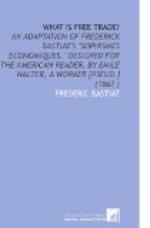All that we could have further to hope for, would be, that human intellect might sink and become extinct; for, while intellect exists, it cannot but seek continually to increase the proportion of the end to the means; of the product to the labor. Indeed it is in this continuous effort, and in this alone, that intellect consists.
Sisyphism has been the doctrine of all those who have been intrusted with the regulation of the industry of our country. It would not be just to reproach them with this; for this principle becomes that of our administration only because it prevails in Congress; it prevails in Congress only because it is sent there by the voters; and the voters are imbued with it only because public opinion is filled with it to repletion.
Let me repeat here, that I do not accuse the protectionists in Congress of being absolutely and always Sisyphists. Very certainly they are not such in their personal transactions; very certainly each of them will procure for himself by barter, what by direct production would be attainable only at a higher price. But I maintain that they are Sisyphists when they prevent the country from acting upon the same principle.
CHAPTER IV.
EQUALIZING OF THE FACILITIES OF PRODUCTION.
The protectionists often use the following argument:
“It is our belief that protection should correspond to, should be the representation of, the difference which exists between the price of an article of home production and a similar article of foreign production. A protective duty calculated upon such a basis does nothing more than secure free competition; free competition can only exist where there is an equality in the facilities of production. In a horse-race the load which each horse carries is weighed and all advantages equalized; otherwise there could be no competition. In commerce, if one producer can undersell all others, he ceases to be a competitor and becomes a monopolist. Suppress the protection which represents the difference of price according to each, and foreign produce must immediately inundate and obtain the monopoly of our market. Every one ought to wish, for his own sake and for that of the community, that the productions of the country should be protected against foreign competition, whenever the latter may be able to undersell the former.”
This argument is constantly recurring in all writings of the protectionist school. It is my intention to make a careful investigation of its merits, and I must begin by soliciting the attention and the patience of the reader. I will first examine into the inequalities which depend upon natural causes, and afterwards into those which are caused by diversity of taxes.




